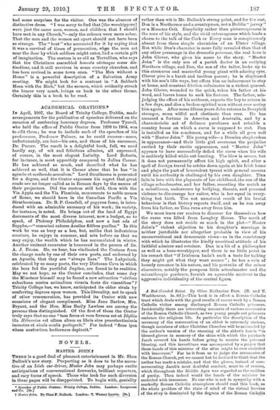NOVELS.
IIIASTE$
TrrEuE is a good deal of pleasant entertainment in Mr. Shan Bullock's new story. Pturporting as it does to be the narra- tive of an Irish car-driver, Master John may perhaps excite anticipations of conversational fireworks, brilliant repartees, and racy turns of speech. Those who look for such diversion in these pages will be disappointed. To begin with, geniality • Speeches otPublie Oreteret Trinity College, Dublin. London: LonymaUit and Co. [be.] t Master Tobn. By Blau P. Bullock. London: T. Werner Laurie. Dal rather than wit is Mr. Bullock's strong point, and for the rest, Dan is a Northerner and a countryman, not a Dublin" jarvey " or a Munster Celt. Simplicity rather than. picturesqueness is the note of his style, and the vivid extravagance which lends- a charm to the talk of the Cork or Kerry man is conspicuously absent from these simple chronicles of an Ulster village. But while Dan's character is more fully revealed than that of any other personage in the dramatis personae, the real hero is John Glover, who gives his name to the story. "Master John" is the only son of a parish doctor in an outlying Northern village, and Dan, the son of the tailor, looks up to this strenuous and masterful young giant with adoring eyes. Glover pere is a harsh and tactless parent ; he is displeased with his son's idle ways, but offers him no inducement to stay at home, and constant friction culminates in a violent quarrel. John Glover, wounded to the quick, takes his father at his word, and leaves home to seek his fortune. The father, mis- judging the effect of his outburst, expects the boy to return in a few days, and dies a broken-spirited man without ever seeing him again. After some fifteen years John returns to Derryhill stronger, more wilful and obstinate than ever. He has amassed a fortune in America and Australia, and by a characteristic act of defiance purchases and rebuilds a country house on which a curse is supposed to rest. Dan is installed as his coachman, and for a while all goes well with "Master John." His young wife—a Dresden shepherdess in appearance—and their little girl overcome the prejudice excited by their exotic appearance, and "Master John" appears to have successfully defied the curse when his wife is suddenly killed while out hunting. The blow is severe, but it does not permanently affect his high spirit, and after a spell of foreign travel he settles down again at his Irish home and plays the part of benevolent tyrant with general success until his authority is challenged by his own daughter. Tina falls in love with the playmate of her childhood, the son of the village schoolmaster, and her father, resenting the match as a raesallian,ce, endeavours by bullying, threats, and personal violence to discourage her suitor, who is her equal in every- thing but birth. The not unnatural result of his brutal behaviour is that history repeats itself, and as he ran away from his father, so Tina runs away from him.
We must leave our readers to discover for themselves how the curse was lifted from Loughry House. The merit of the story does not reside so much in the plot—" Master John's" violent objection to his daughter's marriage is neither justifiable nor altogether probable in view of his unconventional and democratic views—as in the consistency with which he illustrates the kindly uncritical attitude of his faithful admirer and retainer. Dan is a bit of a philosopher as well as a hero-worshipper, and there is no little point in his remark that "if Irishmen hadn't such a taste for talking they might get what they want sooner " ; he has a vein of homely romance in his nature, and his portraits of the minor characters, notably the pompous little schoolmaster and the misanthropic gardener, furnish an agreeable contrast to the aggressive individuality of the central figure.






















































 Previous page
Previous page